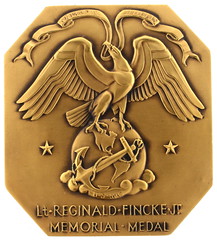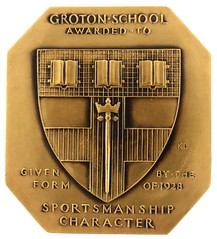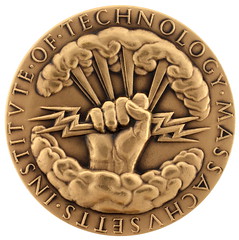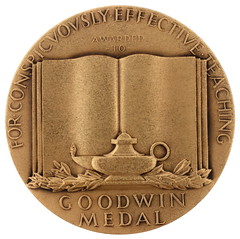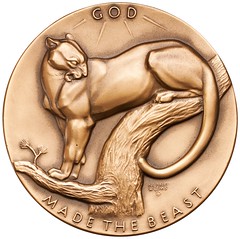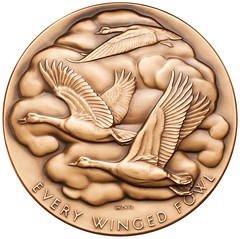
PREV ARTICLE
NEXT ARTICLE
FULL ISSUE
PREV FULL ISSUE
MEDALLIC ART OF KATHARINE LANE WEEMSAn article by Jesse Kraft on the American Numismatic Society Pocket Change blog examines the work of Katharine Lane Weems. -Editor While people today may not recognize her name, the career of Katharine Lane Weems (née Katharine Ward Lane) paralleled those of many well-known sculptors of the 20th century. Born into a well-to-do Boston family in February 1899, she enjoyed a fine education. Her exposure to art no doubt originated through her father—Gardiner Martin Lane, president of the Board of Trustees of the Museum of Fine Arts, Boston. She was named after her aunt, the watercolorist Katharine Ward Lane (d. 1893). In the course of training, she worked under Charles Grafly, George Demetrios, and studied at the summer studios of Anna Hyatt Huntington in Connecticut. As a sculptor, she tended to focus on animal forms. Her work won her a bronze medal at the Philadelphia Sesquicentennial Exposition in 1926, and the prestigious Widener Gold Medal from the Pennsylvania Academy of the Fine Arts the following year. In 1947, she married architect Fontaine Carrington “Canny” Weems. In 1985, she published her memoirs, Odds Were Against Me. If you travel to Boston, it would be difficult not to see Weems’ work, either in public or exhibited in the MFA Boston—where she donated her entire estate after her death in 1989, and endowed the position of Senior Curator of American Decorative Arts and Sculpture. An incredible video exists of Katharine’s sculpting in action. Made for the MFA Boston by the Harvard Film Service in 1930, From Clay to Bronze traced the entire process used to turn her model of a greyhound into a three-dimensional bronze statue. In addition to Weems, the video also shows master mold maker, Leonello “Leo” Toschi, of Caproni and Brother of Boston; and bronze caster, Anton Kunst, of Kunst Art Foundries in New York City. Similar in nature to The Medal Maker with Laura Gardin Fraser, this silent film has since been remastered with piano accompaniments of Erik Satie and the like, as played by Pascal Rogé. The majority of Weems’ works are three-dimensional sculptures in bronze. Even still, she proved herself in the art of bas-relief as well. Her most well-known relief works are undoubtedly her animal friezes that decorate the exterior walls of several buildings of Harvard University from ca. 1931 (Fig. 3). Later in her career, Weems also produced three medals for the Medallic Art Company (MACO).
To read the complete article, see:
Wayne Homren, Editor The Numismatic Bibliomania Society is a non-profit organization promoting numismatic literature. See our web site at coinbooks.org. To submit items for publication in The E-Sylum, write to the Editor at this address: whomren@gmail.com To subscribe go to: https://my.binhost.com/lists/listinfo/esylum All Rights Reserved. NBS Home Page Contact the NBS webmaster 
|
